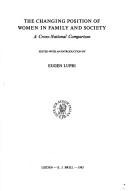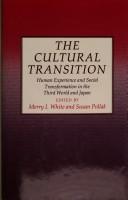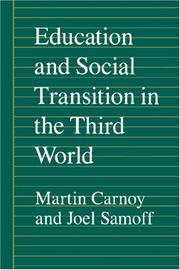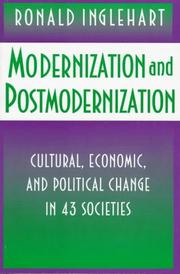| Listing 1 - 7 of 7 |
Sort by
|
Book
ISBN: 0043011764 0043011772 9780043011775 Year: 1984 Publisher: Boston : Allen & Unwin,
Abstract | Keywords | Export | Availability | Bookmark
 Loading...
Loading...Choose an application
- Reference Manager
- EndNote
- RefWorks (Direct export to RefWorks)
Sociology of environment --- Social geography --- Sociology of the developing countries --- Cities and towns --- Urbanization --- Social change --- Cross-cultural studies. --- Cross-cultural studies --- Cities and towns - Cross-cultural studies --- Urbanization - Cross-cultural studies --- Social change - Cross-cultural studies

ISBN: 9004068457 9004476717 9789004068452 9789004476714 Year: 1983 Volume: 34 Publisher: Leiden; Boston : Brill
Abstract | Keywords | Export | Availability | Bookmark
 Loading...
Loading...Choose an application
- Reference Manager
- EndNote
- RefWorks (Direct export to RefWorks)
Women --- Social change --- Sex role --- Cross-cultural studies --- -Social change --- -Sex role --- -#GROL:MEDO-396 --- Gender role --- Sex (Psychology) --- Sex differences (Psychology) --- Social role --- Gender expression --- Sexism --- Change, Social --- Cultural change --- Cultural transformation --- Societal change --- Socio-cultural change --- Social history --- Social evolution --- Human females --- Wimmin --- Woman --- Womon --- Womyn --- Females --- Human beings --- Femininity --- Femmes. Condition. --- Vrouwen. Staat. --- #GROL:MEDO-396 --- Women - Cross-cultural studies --- Social change - Cross-cultural studies --- Sex role - Cross-cultural studies --- Gender roles --- Gendered role --- Gendered roles --- Role, Gender --- Role, Gendered --- Role, Sex --- Roles, Gender --- Roles, Gendered --- Roles, Sex --- Sex roles

ISBN: 0710205724 9780710205728 Year: 1986 Publisher: Boston Routledge and Kegan Paul
Abstract | Keywords | Export | Availability | Bookmark
 Loading...
Loading...Choose an application
- Reference Manager
- EndNote
- RefWorks (Direct export to RefWorks)
Social change --- Social role --- Ethnopsychology --- Educational anthropology --- Cross-cultural studies --- -Social role --- -Role, Social --- Social psychology --- Social status --- Change, Social --- Cultural change --- Cultural transformation --- Societal change --- Socio-cultural change --- Social history --- Social evolution --- Cross-cultural psychology --- Ethnic groups --- Ethnic psychology --- Folk-psychology --- Indigenous peoples --- National psychology --- Psychological anthropology --- Psychology, Cross-cultural --- Psychology, Ethnic --- Psychology, National --- Psychology, Racial --- Race psychology --- Psychology --- National characteristics --- Campus cultures --- Culture and education --- Education and anthropology --- Anthropology --- Culture --- Education --- Philosophy --- Educational anthropology. --- Ethnopsychology. --- Cross-cultural studies. --- -Cross-cultural studies --- Role, Social --- Social change - Cross-cultural studies --- Social role - Cross-cultural studies --- Role (Sociology)


ISBN: 0691631484 1400860695 0691601887 0691023115 9781400860692 9780691631486 Year: 2014 Publisher: Princeton, NJ
Abstract | Keywords | Export | Availability | Bookmark
 Loading...
Loading...Choose an application
- Reference Manager
- EndNote
- RefWorks (Direct export to RefWorks)
Through a comparative analysis of educational theory and practice, this analytic overview illuminates the larger economic and political changes occurring in five peripheral countries--China, Cuba, Tanzania, Mozambique, and Nicaragua--commonly viewed as in transition to socialism. Current political patterns and leadership in these countries have emerged in the context of predominantly agricultural, industrially underdeveloped economies. Each state has played a major role in social transformation, relying on the educational system to train, educate, and socialize its future citizens. Discussing the similarities and differences among these states, the authors show the primacy of politics and the interaction of material and ideological goals in the process of social transition, and how shifting policies reflect and are reflected in educational change. This collection first examines critical analyses of education in capitalist societies, both industrialized and peripheral, and explores the utility of those perspectives in the political and educational conditions of the countries under study. Together these essays offer the first systematic explanation of how and why education in socialist countries undergoing rapid change differs from education in developing capitalist countries. Contributions to the study were made by Mary Ann Burris, Anton Johnston, and Carlos Alberto Torres.Originally published in 1990.The Princeton Legacy Library uses the latest print-on-demand technology to again make available previously out-of-print books from the distinguished backlist of Princeton University Press. These editions preserve the original texts of these important books while presenting them in durable paperback and hardcover editions. The goal of the Princeton Legacy Library is to vastly increase access to the rich scholarly heritage found in the thousands of books published by Princeton University Press since its founding in 1905.
Education and state --- Developing countries --- Cross-cultural studies --- Social change --- Case studies --- Socialism and education --- Economic conditions --- China --- Cuba --- Tanzania --- Mozambique --- Nicaragua --- Education and state - Developing countries - Cross-cultural studies. --- Social change - Developing countries - Case studies. --- Socialism and education - Developing countries - Cross-cultural studies. --- Social change - Cross-cultural studies. --- Developing countries - Economic conditions - Cross-cultural studies. --- Education and state - China. --- Education and state - Cuba. --- Education and state - Tanzania. --- Education and state - Mozambique. --- Education and state - Nicaragua. --- POLITICAL SCIENCE / Political Economy. --- Education and socialism --- Education --- Change, Social --- Cultural change --- Cultural transformation --- Societal change --- Socio-cultural change --- Social history --- Social evolution --- Education policy --- Educational policy --- State and education --- Social policy --- Endowment of research --- Government policy
Book
ISBN: 9781439914175 1439914176 9781439914182 1439914184 Year: 2018 Publisher: Philadelphia Temple University Press
Abstract | Keywords | Export | Availability | Bookmark
 Loading...
Loading...Choose an application
- Reference Manager
- EndNote
- RefWorks (Direct export to RefWorks)
"Participatory democracy calls for the creation and proliferation of practices and institutions that enable individuals and groups to better determine the conditions in which they act and relate to others. Michael Menser's timely book We Decide! is arguably the most comprehensive treatment of participatory democracy. He explains the three waves of participatory democracy theory to show that this movement is attentive to the mechanics of contemporary political practices. Menser also outlines "maximal democracy," his own view of participatory democracy that expands people's abilities to shape their own lives, reduce inequality, and promote solidarity. We Decide! draws on liberal, feminist, anarchist, and environmental justice philosophies as well as in-depth case studies of Spanish factory workers, Japanese housewives, and Brazilian socialists to show that participatory democracy actually works. Menser concludes his study by presenting a reconstructed version of the state that is shaped not by corporations but by inclusive communities driven by municipal workers, elected officials, and ordinary citizens working together. In this era of Bernie Sanders and Donald Trump, the participatory democracy proposed in We Decide! is more significant than ever"--
Political participation --- Democracy --- Politics, Practical --- Social change --- Political science --- Political philosophy --- Electoral politics --- Mass political behavior --- Political behavior --- Politics --- Practical politics --- Citizen participation --- Community action --- Community involvement --- Community participation --- Involvement, Community --- Participation, Citizen --- Participation, Community --- Participation, Political --- Political activity --- Philosophy --- #SBIB:324H50 --- #SBIB:35H501 --- Politieke participatie en legitimiteit (referenda, directe democratie, publieke opinie...) --- Bestuur en samenleving: netwerken, inspraak, participatie, interactief beleid --- Political rights --- Social participation --- Political activists --- Political participation - Cross-cultural studies --- Democracy - Cross-cultural studies --- Politics, Practical - Cross-cultural studies --- Social change - Cross-cultural studies --- Political science - Philosophy

ISBN: 0521529506 0521822033 0511550367 0511888902 9780521529501 9780521822039 9780511550362 Year: 2003 Publisher: Cambridge Cambridge University Press
Abstract | Keywords | Export | Availability | Bookmark
 Loading...
Loading...Choose an application
- Reference Manager
- EndNote
- RefWorks (Direct export to RefWorks)
The twentieth century gave rise to profound changes in traditional sex roles. However, the force of this 'rising tide' has varied among rich and poor societies around the globe, as well as among younger and older generations. Rising Tide sets out to understand how modernization has changed cultural attitudes towards gender equality and to analyze the political consequences of this process. The core argument suggests that women and men's lives have been altered in a two-stage modernization process consisting of (i) the shift from agrarian to industrialized societies and (ii) the move from industrial towards post industrial societies. This book is the first to systematically compare attitudes towards gender equality worldwide, comparing almost 70 nations that run the gamut from rich to poor, agrarian to postindustrial. Rising Tide is essential reading for those interested in understanding issues of comparative politics, public opinion, political behavior, political development, and political sociology.
Sex role --- Women's rights --- Social change --- Social values --- Women in politics --- Values --- Change, Social --- Cultural change --- Cultural transformation --- Societal change --- Socio-cultural change --- Social history --- Social evolution --- Rights of women --- Women --- Human rights --- Gender role --- Sex (Psychology) --- Sex differences (Psychology) --- Social role --- Gender expression --- Sexism --- Civil rights --- Law and legislation --- Legal status, laws, etc. --- #SBIB:316.346H20 --- #SBIB:316.7C160 --- Political activity --- Positie van de vrouw in de samenleving: algemeen --- Cultuursociologie: contact tussen culturen --- Sociology of the family. Sociology of sexuality --- Sociology of culture --- Cross-cultural studies. --- Sociologie van de cultuur --- Sociologie van het gezin. Sociologie van de seksualiteit --- Social Sciences --- Political Science --- Sex role - Cross-cultural studies. --- Women's rights - Cross-cultural studies. --- Social change - Cross-cultural studies. --- Social values - Cross-cultural studies. --- Women in politics - Cross-cultural studies. --- Gelijkekansenbeleid. --- Vrouwen; politiek.

ISBN: 069101180X 0691011818 0691214425 9780691011806 Year: 1997 Publisher: Princeton : Princeton University Press,
Abstract | Keywords | Export | Availability | Bookmark
 Loading...
Loading...Choose an application
- Reference Manager
- EndNote
- RefWorks (Direct export to RefWorks)
Ronald Inglehart argues that economic development, cultural change, and political change go together in coherent and even, to some extent, predictable patterns. This is a controversial claim. It implies that some trajectories of socioeconomic change are more likely than others--and consequently that certain changes are foreseeable. Once a society has embarked on industrialization, for example, a whole syndrome of related changes, from mass mobilization to diminishing differences in gender roles, is likely to appear. These changes in worldviews seem to reflect changes in the economic and political environment, but they take place with a generational time lag and have considerable autonomy and momentum of their own. But industrialization is not the end of history. Advanced industrial society leads to a basic shift in values, de-emphasizing the instrumental rationality that characterized industrial society. Postmodern values then bring new societal changes, including democratic political institutions and the decline of state socialist regimes. To demonstrate the powerful links between belief systems and political and socioeconomic variables, this book draws on a unique database, the World Values Surveys. This database covers a broader range than ever before available for looking at the impact of mass publics on political and social life. It provides information from societies representing 70 percent of the world's population--from societies with per capita incomes as low as
Social change --- Progress --- Political development --- Economic development --- Progrès social --- Développement politique --- Développement économique --- Changement social --- Cross-cultural studies --- Cross-cultural studies. --- Etudes transculturelles --- -Political development --- -Economic development --- -Social change --- -316.323.9 --- -303.44 --- Change, Social --- Cultural change --- Cultural transformation --- Societal change --- Socio-cultural change --- Social history --- Social evolution --- Development, Economic --- Economic growth --- Growth, Economic --- Economic policy --- Economics --- Statics and dynamics (Social sciences) --- Development economics --- Resource curse --- Development, Political --- Political science --- Social progress --- Civilization --- Regression (Civilization) --- Social stability --- Postmoderne maatschappij. Sociologie van het postmodernisme --- 316.323.9 Postmoderne maatschappij. Sociologie van het postmodernisme --- Progrès social --- Développement politique --- Développement économique --- 303.44 --- 316.323.9 --- Sociale verandering --- Wirtschaftsentwicklung. --- Modernisierung. --- Postmoderne. --- Wandel. --- Vergleich. --- Industriegesellschaft. --- Wertwandel. --- Sozialer Wandel. --- Geschichte. --- Politischer Wandel. --- Kulturvergleich. --- Fortschritt. --- Argentina. --- Bean, Clive. --- Buerklin, Wilhelm. --- Catholic societies. --- China. --- France. --- Hungary. --- Materialist values. --- Postmaterialist values. --- Republikaner Party. --- Soviet Union. --- abortion. --- achievement motivation. --- class conflict. --- cognitive mobilization. --- democracy. --- diminishing marginal utility. --- divorce. --- economic growth. --- environmental protection. --- government spending. --- immigration. --- institutional determinism. --- investment. --- legitimacy. --- life satisfaction. --- mass participation. --- national pride. --- organizational memberships. --- political interest. --- Progress - Cross-cultural studies. --- Political development - Cross-cultural studies. --- Economic development - Cross-cultural studies. --- Social change - Cross-cultural studies. --- Fortschrittsgedanke --- Innovation --- Interkultureller Vergleich --- Cross-cultural Analysis --- Vergleich --- Systemtransformation --- Systemwandel --- Systemwechsel --- Politische Entwicklung --- Wandel --- Modernité --- Postmodernisme --- Etudes comparatives
| Listing 1 - 7 of 7 |
Sort by
|

 Search
Search Feedback
Feedback About UniCat
About UniCat  Help
Help News
News